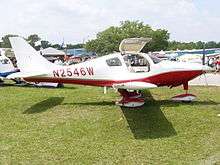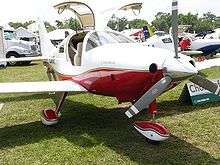Cessna 350 Corvalis
| Cessna 350 Corvalis | |
|---|---|
 | |
| Role | Personal aircraft |
| Manufacturer | Cessna |
| Status | Production completed 2010[1] |
| Produced | 2000-2010 |
| Unit cost | |
| Variants | Cessna 400 |


The Cessna 350 Corvalis is a composite construction, single-engine, normally aspirated, fixed-gear, low-wing general aviation aircraft built by Cessna Aircraft until the end of 2010.[1][3]
The aircraft was formerly called the Columbia 350 when it was built by Columbia Aircraft.[4]
Design and development
Columbia 300
Developed as the Model LC40-550FG (for Lancair Certified, Model 40, Continental 550 engine, Fixed Gear) and marketed under the name Columbia 300, the aircraft was certified on September 18, 1998.[5] Deliveries began in February 2000.[6]
The 300 is powered by a Teledyne Continental Model IO-550-N engine of 310 horsepower (230 kW) at 2700 rpm. The aircraft's maximum takeoff weight is 3400 lb (1542 kg) and the maximum landing weight is 3230 lb (1465 kg).[5]
The 300 has a certified airframe life of 25,200 flight hours.[5]
Columbia 350
The Columbia 300 was upgraded with a glass cockpit and other improvements developed for the turbocharged Columbia 400. It was certified on March 30, 2003 as the Model LC42-550FG (for Lancair Certified, Model 42, Continental 550 engine, Fixed Gear) and marketed as the Columbia 350.[5]
Like the 300, the 350 is powered by a Teledyne Continental IO-550-N powerplant producing 310 horsepower (230 kW) at 2700 rpm. The 350 has the same takeoff and landing weights as the 300; maximum takeoff weight is 3400 lb (1542 kg) and the maximum landing weight is 3230 lb (1465 kg).[5]
Like the 300 and 400, the 350 has a certified airframe life of 25200 flight hours.[5]
Initially sold simply as the Cessna 350, the aircraft was given the marketing name Corvalis by Cessna on 14 January 2009. The name is a derivation of the town of Corvallis, Oregon which is west of the Bend, Oregon location of the Cessna plant that built the aircraft, prior to closing the plant and relocating production to Independence, Kansas in 2009.[3][7][8][9]
In April 2009 Cessna announced that it would close the Bend, Oregon factory where the Cessna 350 was produced and move production to Independence, Kansas, with the composite construction moved to Mexico. The production line was restarted in October 2009 at the Cessna Independence paint facility, initially at a rate of one aircraft in six months. This was to allow the new workers, plus the 30 employees transferred from Bend, to gain experience and also allow Cessna the opportunity to retail its unsold inventory of Cessna 350s and 400s. The company had anticipated moving the 350/400 production into a permanent facility by the end of 2009.[8][10]
In December 2010 a Cessna 400 that was being test flown at the factory developed a fuel leak, the cause of which was determined to be that the aircraft had "suffered a significant structural failure in the wing during a production acceptance flight test. The wing skin disbonded from the upper forward wing spar. The length of the disbond was approximately 7 feet." As a result, the FAA issued an Emergency Airworthiness Directive affecting seven Cessna 400s and one 350, all on the production line. The AD did not affect any customer aircraft in service, but did delay deliveries.[11][12]
In March 2011 Cessna announced that the model was out of production and removed marketing information from its website.[1]
Specifications (Cessna 350)
Source: Cessna Aircraft[13]
General characteristics
- Crew: one pilot
- Capacity: three passengers
- Length: 25 ft 2 in (7.67 m)
- Wingspan: 36 ft 1 in (11.0 m)
- Height: 9 ft 0 in (2.74 m)
- Wing area: 141 sq ft (13.1 m²)
- Empty weight: 2,300 lb (1,000 kg)
- Max. takeoff weight: 3,400 lb (1,500 kg)
- Powerplant: 1 × Teledyne Continental Motors IO-550-N (TCM IO-550-N) flat-6 engine, 310 hp (230 kW)
Performance
- Maximum speed: 191 knots (220 mph, 354 km/h)
- Range: 1,496 mi (1,300 nmi, 2,038 km)
- Service ceiling: 18,000 ft (5,486 m)
- Rate of climb: 1,500 ft/min (7.6 m/s)
- Wing loading: 25.5 lb/(sq ft) (125 kg/m²)
- Power/mass: 0.091 hp/lb (150 W/kg)
References
- 1 2 3 Bertorelli, Paul (March 2011). "Video: Cessna's New Corvalis TTx at Sun 'n Fun". AvWeb. Retrieved 30 March 2011.
- ↑ Cessna Aircraft (2009). "Cessna 350 Pricing and Cost". Archived from the original on 8 July 2011. Retrieved 26 August 2010.
- 1 2 Cessna (January 2009). "Low Wing. High performance.". Archived from the original on 2009-01-20. Retrieved 2009-01-17.
- ↑ Textron (November 2007). "Textron's Cessna Aircraft Company to Acquire Assets of Columbia Aircraft". Retrieved 2007-11-28.
- 1 2 3 4 5 6 Federal Aviation Administration (January 2008). "TYPE CERTIFICATE DATA SHEET A00003SE Revision 22" (PDF). Retrieved 2008-09-23.
- ↑ Airliners.net. "The Lancair LC-40 Columbia 300/350/400". Retrieved 2015-09-08.
- ↑ Cessna (January 2009). "Cessna Debuts 350 Corvalis and 400 Corvalis TT". Retrieved 2009-01-17.
- 1 2 Grady, Mary (April 2009). "Cessna Will Suspend Columbus Program, Close Bend Factory". Retrieved 2009-04-30.
- ↑ Phelps, Mark (May 2009). "Cessna Closes Oregon Factory; Suspends Large-Jet Program". Retrieved 2009-05-11.
- ↑ Pew, Glenn (October 2009). "Cessna Resumes Corvalis Production, Not In Bend". Retrieved 2009-10-12.
- ↑ Niles, Russ (December 2010). "Composite Issue Stops Corvalis Deliveries". AvWeb. Retrieved 13 December 2010.
- ↑ Federal Aviation Administration (December 2010). "Airworthiness Directive AD 2010-26-53". Retrieved 13 December 2010.
- ↑ Cessna Aircraft (2008). "The Cessna 350". Archived from the original on 2008-12-05. Retrieved 2008-09-24.
External links
![]() Media related to Cessna 350 at Wikimedia Commons
Media related to Cessna 350 at Wikimedia Commons